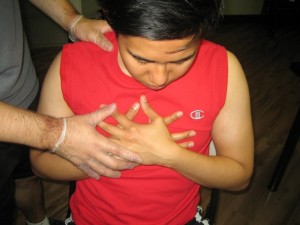Heartburn is a misnomer as the heart is not involved, nor is it burning. Rather, heartburn pertains to the warm, painful burning sensation that occurs in the throat or behind the sternum (breastbone). It is often worsened by bending over or lying down. It is caused by the acid reflux from the stomach to the esophagus. The discomfort generally starts in the chest area but slowly spreads to the neck, throat and jaw in a wave-like motion. Medically, heartburn is known as pyrosis or acid indigestion.
As a person swallows, the lower esophageal sphincter relaxes for a few seconds to make way for food and liquid to enter the stomach. During these few seconds, acid may reflux back into the esophagus. Thus, heartburns commonly occur after eating when the sphincter relaxes several times.
Heartburn and acid reflux are not interchangeable. While heartburn refers to the pain/ discomfort, acid reflux is the action where the gastric acid goes back to the esophagus. Acid reflux leads to heartburn. If heartburn occurs two or more times a week, it may be a symptom of an underlying disease, Gastroesophageal Reflux Disease (GERD). Moreover, heartburn is not a diagnosis on its own.

Causes of Heartburn
The following conditions may lead to a weakened lower esophageal sphincter leading to heartburn:
- GERD
- Obesity
- Pregnancy
- Hiatal hernia
- Smoking
- Foods such as chocolates and fried and fatty foods
- Drinks such as carbonated beverages, alcohol, caffeine, and acidic juices
- Medications such as ibuprofen, naproxen and aspirin
First Aid Management for Heartburn
Heartburn does not require medical attention as it is not life threatening. However, when it has become more frequent, it may be time to seek medical help. To help alleviate heartburn symptoms, one can follow the next steps:
- Take over the counter antacids to help neutralize the acidity of the stomach’s juices.
- Better to sit up rather than lie down as this may worsen the pain.
- Medications are available to decrease acid production. These H2 blockers include cimetidine, nizatidine, famotidine and ranitidine.
- Proton pump inhibitors medications are also available to stop the production of acid altogether.
It is best to seek medical advice with regard to the proper medications to use. Moreover, enrolling in First Aid Courses can help in the home treatment of common symptoms of various diseases.
Prevention of Heartburn
Heartburn may not always be stopped from recurring, however, the following preventive tips can help reduce the frequency of heartburns:
- Try to identify what triggers the heartburn and avoid this. It would be better to avoid the foods that are known to trigger heartburn.
- For overweight individuals, try to start losing weight and stay in the ranges of the normal BMI.
- Opt for small but frequent meals.
- After eating, wait three hours before lying down. Raise the head.
- To help reduce the pressure on the abdomen and the lower esophageal sphincter, avoid wearing tight-fitting clothes especially around the waist.
- Do not smoke.
Heartburn is the painful burning sensation that occurs in the back of the sternum of the throat and usually happens after eating meals.
